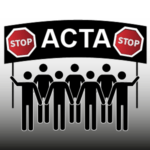Freedom of expression is a thorn in the side of EU technocrats. The new intellectual property law adopted by the European Parliament in September threatens our fundamental rights.1)European Parliament, Copyright in the Digital Single Market, Proposal for a directive COM(2016)0593 – C8-0383/2016 – 2016/0280(COD)
Internet means freedom. Still. We can (still) freely retrieve content with our search engines. We can (still) freely and without further ado access the sources in a text. This will soon change. Article 13 of the controversial law says that website operators and Internet providers will be held accountable for the content of their customers and readers. The new law thus obliges them to use the so-called upload filters. The filter obligation leaves it to the software to decide what users are allowed to upload and what not. In plain language it says the provider will control and censor our activities on the net: every uploaded photo, video, every text will be checked. The question arises: what criteria will apply to this censorship and how and by whom will this filter software be programmed? The EU Commission will certainly soon be proposing detailed guidelines to combat fake news, the spread of terrorism on the Internet, and to combat those who infringe copyrights. All right, but it will also be a tool to suppress the critics of the EU, independent bloggers who want to throw light on the incompetence and insolence of the Brussels technocrats, dissidents (not left-wing liberals). And I bet: the directives will be introduced very quickly and eagerly in all EU countries.
 Source: shutterstock.com
Source: shutterstock.comArticle 11 deals with the introduction of a kind of tax on links. From now on, when we publish a link on our website, we have to pay the owner (the author or publisher) for it. Technocrats believe that if we refer to a specific source and link it in our text, the source is entitled to a remuneration. Of course, there is not a word of exact amounts in the law, this should only be determined after negotiations with EU member states. Now, if an editorial staff decides to earn with the new law, then search engines will not show up results containing links to their content. A double-edged sword for editors and publishers, because customers can now turn to the sources that will continue to make their content available free of charge. The law turns the Internet, which we know, upside down. The work of the journalists, the scientists, who have to publish online and quote in their publications in order to be credible and to prove their theses, is made more difficult. The existence of whole net culture with its memes, music remixes, parodies, the media archive of Wikipedia, etc. and the most important thing: freedom of opinion, is threatened. The new law should secure the future of the press. Freidhelm Greis of Golem.de calculated that the new EU ancillary copyright law actually favours only large publishing houses and editorial offices, not the smaller and more critical ones. The Axel Springer publishing house would receive at present nearly 64 per cent of the incomes from the left taxation.2)So viel Geld würden die Verlage von Google bekommen, Friedhelm Greis, golem.de, 2018-09-07This proves who the Brussels technocrats serve. They are gradually depriving us of our freedoms so that big companies can make even higher profits. One company that will lose with the introduction of the new EU directives is Google. It would have to share millions of euros of its revenue even in Germany with the website providers, publishers and cycling companies to which its search results are passed on.
Google has already had such experience in Spain, where such a controversial law was introduced as early as 2014. The publishers hoped the law would make them richer. Payable licenses on current press releases should make the American company cough up money for them. And look what happened: Google simply shut down its Google News in Spain in order not to have to pay any fees. Although Google News did not contain advertising, with which the company mainly earns its money, there has been no added value for Google since then that came from this information service (Google simply lost many readers). And the Spanish publishers have “shot themselves in the foot with it: because with external access the access have decreased by double-digit percentages”.3)WinFuture, Schuss ins Knie: spanische Seiten leiden nach dem Google-News-Aus, 2014-12-17
Finally, I shall quote just one other Article 11, the Charter of Fundamental Rights of the European Union: “Everyone has the right to freedom of expression. This right shall include freedom to hold opinions and to receive and impart information and ideas without interference by public authority and regardless of frontiers.”
Copyright must not jeopardise fundamental rights. Period.
References
| 1. | ↑ | European Parliament, Copyright in the Digital Single Market, Proposal for a directive COM(2016)0593 – C8-0383/2016 – 2016/0280(COD) |
| 2. | ↑ | So viel Geld würden die Verlage von Google bekommen, Friedhelm Greis, golem.de, 2018-09-07 |
| 3. | ↑ | WinFuture, Schuss ins Knie: spanische Seiten leiden nach dem Google-News-Aus, 2014-12-17 |





One comment on “ACTA 2.0 – the end of freedom on the Internet”
Internet users fundamental rights must be protected by law in respective countries. But how can we protect our data from the hackers who are now advancing to be able hack even what we have stored in our brains.